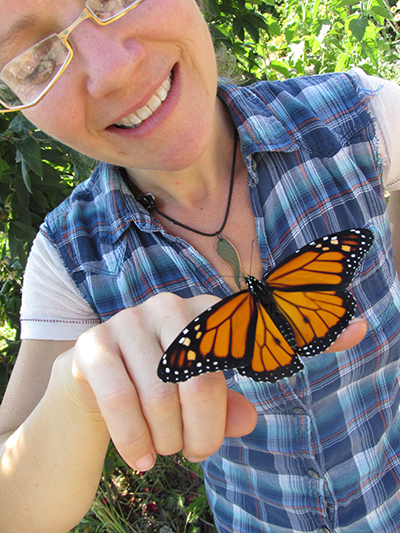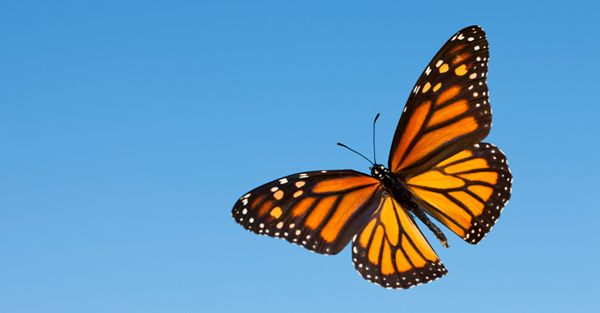Beyond Toxics is publicizing local gardens friendly to our increasingly fragile population of pollinators. In this blog we visit Jessica Jackowski’s garden in Eugene.
Along a path at Crow Feather Farm, borage blossoms unfurl in spirals. A honeybee dances among them, then attaches herself upside down to a nectar-rich mini-grotto, proboscis sucking up sweetness. A few spirals over, a plump velvety bumblebee alights, and a hummingbird waits on a post nearby.
Jessica’s vegetables and flowers spill over each other here in deceptively haphazard exuberance. I’ve come to learn about attracting pollinators, but her holistic vision doesn’t allow for one-tracked goals. Everything here supports everything else. The borage offers its pollen to bees and butterflies, while its deep taproot softens hard soil. Likewise, its fleshy foliage can be used for mulch, and is a great addition to the compost pile.
A few yards away, in its own microclimate, a patch of red leaf lettuce is shaded by tall buckwheat drinking up the sun. Buckwheat is a “wonderful nectary,” notes Jessica, and “makes rich dark honey.” It’s a fast growing cover crop, too, flowering quickly. “If there’s a bare spot in your garden, and you’re not ready to plant for a month or two, buckwheat is perfect.”

Jess with male Monarch
She touts culinary herbs as well. “Plant more than you need, and let several flower and go to seed; bees will be all over them.” Thyme, oregano, winter savory, and mint peek through mulch throughout her garden. Veggies too are pollen providers. We can let a few perennial leeks go unharvested, and curb that impulse to rip out bolting kale. Insects love the flowers of both.
As we amble along, Jessica identifies a vigorous plant as parsnip. It turns out parsley, dill and parsnip are all insect playgrounds. Their umbel structure -- hundreds of tiny clustered flowers arranged in concentric circles — seduce a wide range of pollinators. Beneficial insects such as parasitic wasps and lacewings are also frequent visitors.
Jessica states, “I’m trying to create a habitat not only for my family, but other beings too. The more I’m integrating and supporting all parts of the garden -- the habitat for birds and insects, the microbes in the soil, all the different players -- the stronger it’s becoming.”
The relationship is reciprocal. Five years ago a member of NABA (North American Butterfly Association) noticed the abundant nectaries at Crow Feather Farm and donated milkweed, the unique host for Monarch butterfly larvae. Two years later, when the plants flowered in June, Jessica brought a bouquet inside the house for her child’s fourth birthday. After a week or two, they found a Monarch caterpillar on a milkweed leaf; it had hatched right on the bouquet.
The Monarchs return annually to lay their eggs on the milkweed patch, and “for Avery’s birthday, we raise a butterfly every year.”
******************************
Please join Jessica 10am on Saturday, August 20 for a tour of multi-functional late summer pollinator friendly plants at Crow Feather Farm. Email growfoodlearnhow@gmail.com to reserve your spot and get location details. Space is limited.
For more information visit www.crowfeatherfarm.com or contact Jessica at growfoodlearnhow@gmail.com.






